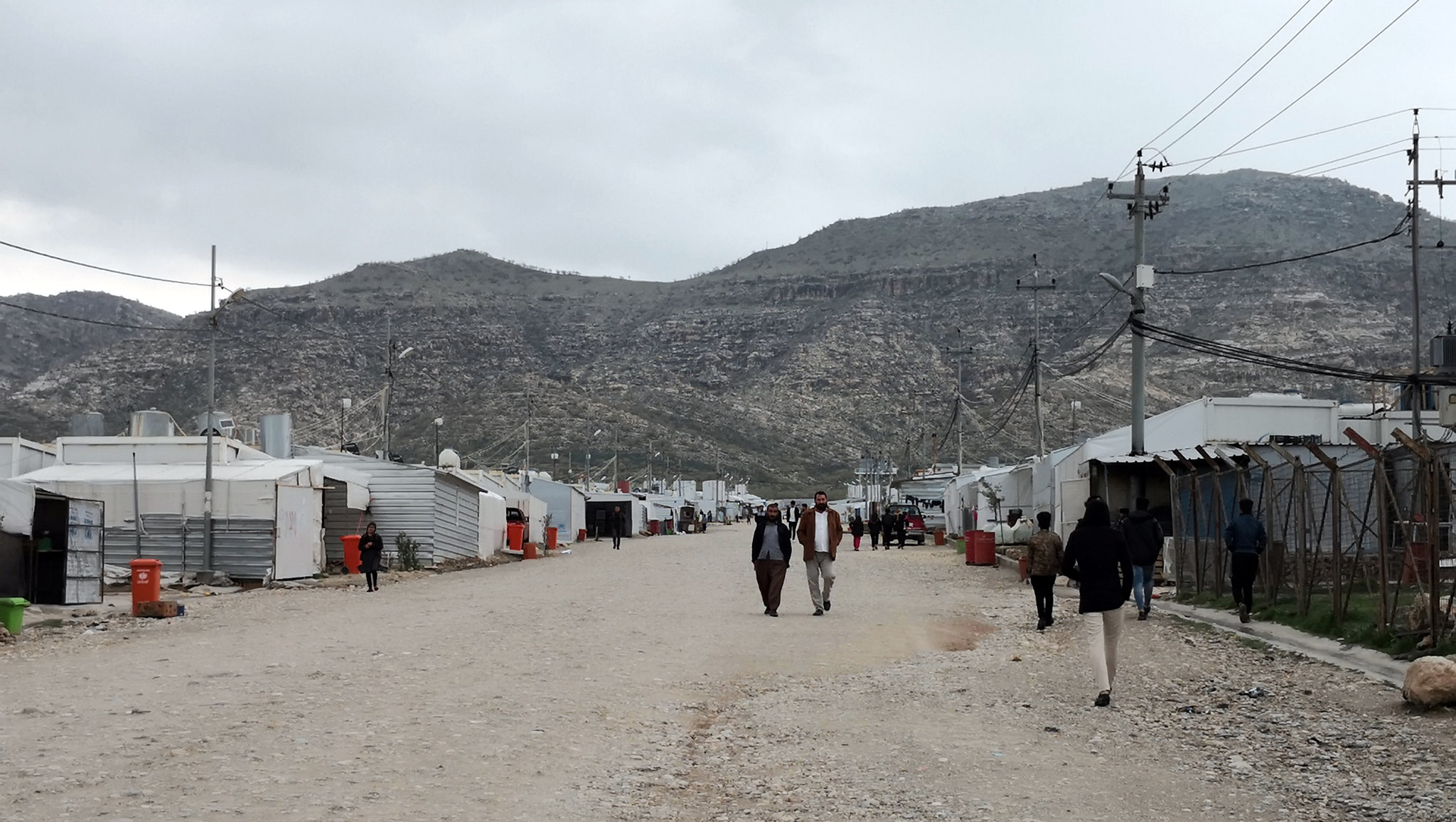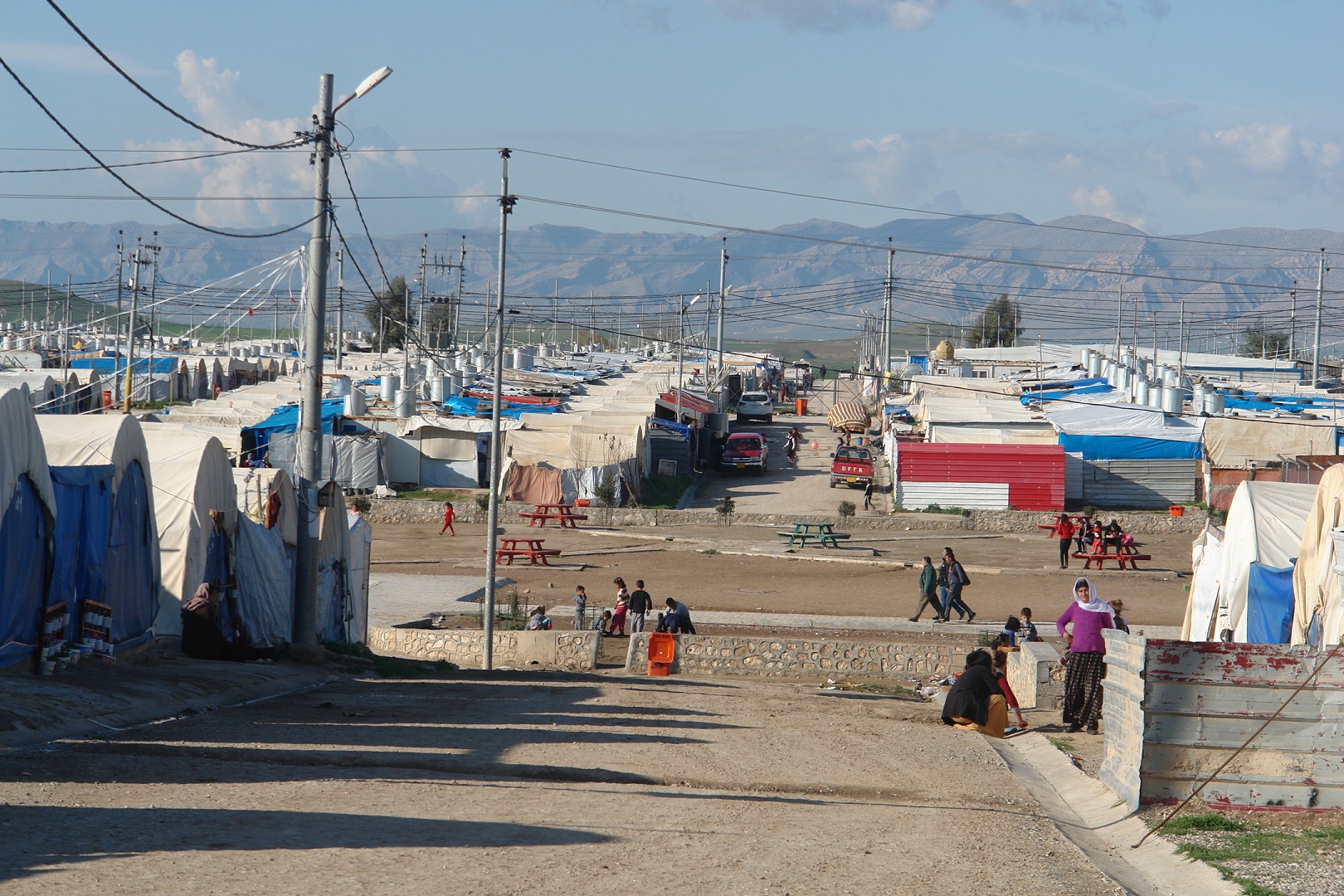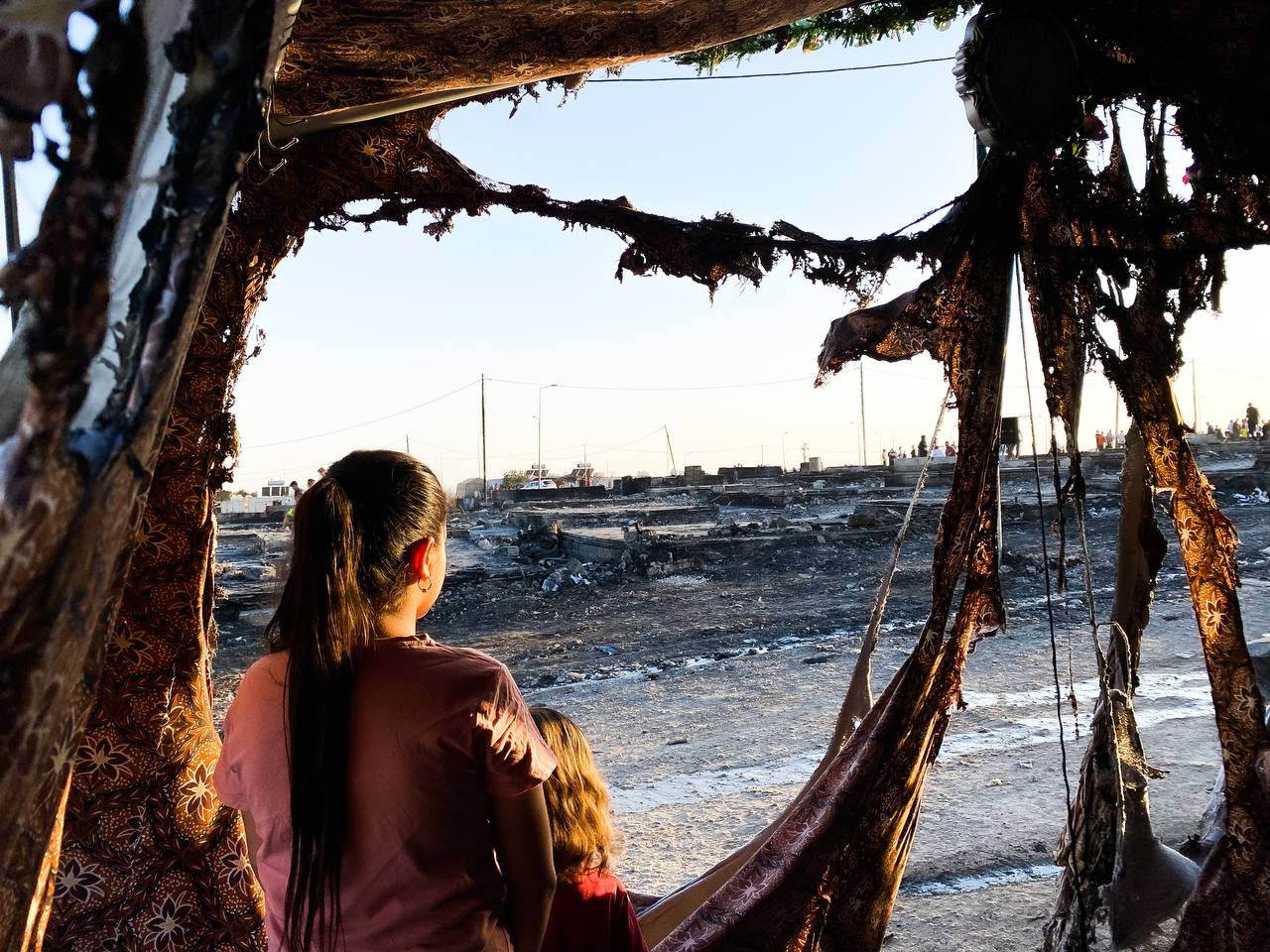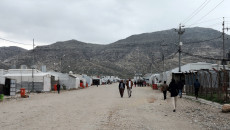Zhina, six-year-old girl, can’t attend school because her father denied his marriage and disappeared while the mother, Samira, is leading a hard life following the unregistered marriage, leaving the kid without any identification and the mother is still officially registered as virgin per her Iraqi civil status identity card ID.
Zhina and Samira, both pseudonyms for their safety, live a camp for internally displaced persons IDPs in the northern province of Duhok where there are 16 camps for IDPs, mainly Ezidis (Yazidis) from the war-torn Shingal (Sinjar), a district under Ninewa province.
The birth of Zhina
Samira gave birth to Zhina six years ago, following 2014 events, when the Ezidi community fled their home town in fear of the atrocities by the extremist militants of the Islamic State of Iraq and Syria ISIS accused them of being “Devil Worshippers” for being non-Muslims. The crimes amounted to genocide according to the United Nations and several European parliaments.
The family of Samira then fled Gir Ouzer subdistrict to Mount Shingal where some families are living up today while majority fled toward Duhok. Samira was only 22. The family decides to stay on the mountain while Samira manages to convince her parents to leave to Duhok and escape the blazing summer under tents and poor living conditions.
“Life on Mount Shingal was tough. It was too hot and unpleasant. Then, lots of people were leaving and I got permission of my mother to leave with those people to Zakho in Duhok,” Samira recalls her bitter story.
The local administration of Duhok province decided to take the IDPs to Sharia complex. A month later, it has opened Sharia camp for Ezidi IDPs and Samira got a tent alike any other family.
At the end of 2014, two women, one of them Samira came to know at the camp, tell Samira there is a good young man they would like to introduce him to marry her, said Samira. She decides to meet him then decide how to proceed.
Two women tell Samira there is a good young man they would like to introduce him to marry her
“Few days later, I met the young man and agreed to marry him on the condition of registering engagement at court and he agreed and was ready to do everything in order to live together.”
Ten days later, the young man visits Samira at her tent to talk about marriage details. “He wanted to touch me but I did not give him any chance.”
According to Islamic Sharia and Eastern traditions, sex is a taboo for couple before getting married by a clergy and registration of the marriage at court by civil authorities.
Ezidis are an ethno-religious minority over half a million population, mostly residing in Shingal and Shekhan in northern Iraqi province of Ninewa. The militants of the extremist group of Islamic State in Iraq and Syria ISIS in 2014 attacked their communities accusing them of being heretics, killing thousands of men and taking thousands of women and children as sex slaves.
Ezidism is an old Middle Eastern monotheistic ethnic religion and is based on belief in one God who created the world and entrusted it into the care of seven Holy Beings, known as Angels. The ouststanding among these angels is Melek Taus who is the leader and has authority over the world.
Most Ezidis speak Kurmanji, one of the two main Kurdish dialects, however, most Ezidis consider Ezidism a religious not ethnic identity.

Samira says then he was coming to the tent regularly, every time trying to have sex with her yet she rejected it.
“One day he showed up and vowed he will marry me at court so we spent about two months together in my tent as any other husband and wife. I kept reminding him to get married by Ezidi cleric and at court,” she elaborated, “yet he kept delaying it and getting nervours when it came to that point.”
She confirmed that she has not informed her family about her relationship and did not seek their permission for the marriage.
Samira got pregnant, the husband disappears
“He kept saying that he was looking for baby names so I thought he will be happy for me to be pregnant and become real husband and wife. In March 2015, I went to camp health center and they told me I am pregnant."
Automatically, she tells her husband.
“He got nervous and turned upset. He packed a bag the same day and said he has to stay by his sister at hospital. I asked him why you pack all these things and he responded he might need to stay for days there.”
I thought he will be happy for me to be pregnant and become real husband and wife
The man disappears and she has not seen him again since that day. He switched off his cell phone and has not been on even once.
“I was really bored. I stayed at night alone for days. The camp administration was told about my story but nothing changed in my life.”
She tried to keep it secret and even files no complaint yet the pregnancy is getting mature so she decides to stay in camp in order to avoid reporach and critiques by the neighbors.
“I tried miscarriage twice but I did regret at the end so finally I decided to tell my story to an aid NGO commuting to the camp,” Shaima told KirkukNow.
I tried miscarriage twice but I did regret at the end
The administration of the camp in cooperation with aid NGOs and security services, decided to transfer Samira to a shelter for abused women in Duhok where she safely delivers her baby.
On December 28th, 2015, she gives birth to a baby girl. Zhina is now almost six and half years old. Post-delivery, the poor mother decides to file a lawsuit against the father.
She attends court escorted by staff of the aid NGO and local security services.
“The judge asked to share any information if I have about the man but I had nothing. He asked me if I would like to live in camp and I said yes but to another camp.”
The manager of Sharia camp then who is now in a high position in Duhok local administration denied responding to phone calls of KirkukNow seeking comments.

Upon her request, Samira was transferred to another IDP camp where she lives since then up today.
According to the statistics of the Joint Crisis Coordination Center of the Ministry of Interior of the Kurdistan regional Government KRG, there are more than 664,000 IDPs in the Kurdistan Region, most of them live under tents in 26 camps mainly in Dohuk, in addition to 261,000 refugees.
30% of the IDPs are Ezidis that have not returned to their hometowns for absence of security, stability, reconstruction and reparation, while Christians make 10%.
“I have thought about suicide more than once because I went hopeless.”
She does not talk to her family about her marriage and pregnancy story. “Now and then, my mother and a sister of mine call me.”
Samira has not talked to her father up to 40 days after delivering her baby. She tells him her story and they never talked again. Her family lives in the sub-district of Sinuny, under Shingal district.
“Samira left Mount Shingal upon her decision. My father begged her not to leave but she didn’t listen. People were thirsty and hungry and she was fragile. Finally, my mother let her go,” a brother of Shiama anonymously told KirkukNow over the phone.
My father begged her not to leave but she didn’t listen
“That boy has deceived my sister and sexually abused her,” the brother bitterly said. “How a man in a camp dares to do so while the administration claims it has no information who he was?”
Despite frequent calls by KirkukNow, the old administration denied commenting over the issue.
“It is true that we have not visited her while she was in camp but if she returns home, we will certainly welcome her because she has committed no crime,” her brother confirmed. “She is now in a bad psychological state. Maybe she was also weak then and deceived.”
Samira affirmed that out of four sisters and five brothers, only her mother and one of her sisters talk to her. “No one paid me a visit since I left Mount Shingal.”
Where is the fugitive?
The former director of the camp in which Samira is currently living with her daughter said, "Since Samira arrived in the camp, she was not in a good psychological condition, we conducted a close follow-up with the security forces, including the Asayish forces, for Samira's case. We identified the identity of the suspect. He is a resident of the Khatary complex.”
Khatary complex is located in the Alqosh sub-district in the Tel Kaif district of Ninewa province and is inhabited by a Yezidi majority.
The camp director, who is also a member of the Ezidi community, and manager of Shingal office for the Barzani Charity Foundation, which runs the camps for the displaced, told KirkukNow, "I told the Asayish (security) forces of Dohuk that man left Iraq and immigrated to Europe."

Samira and her daughter are now supported by camp residents and some donors.
"We brought Samira's case to the international organizations, later several Yazidi and Muslim families expressed their willingness to adopt Samira's daughter, but she did not accept that," camp manager said.
One of the two women who first introduced Samira to the man was interrogated, and she appeared before the judge and briefed the court on the details of what happened, according to Samira “but the other woman disappeared and could not be found."
To conduct this follow-up, KirkukNow several times contacted Duhok Asayish who is handling the case, seeking statements but they did not respond.
"We have no knowledge of the details of this case, and no one has registered such a case with us in order to follow it up," said Jahur Ali Beg, Deputy of the Mir (prince) of the Ezidis for media affairs.
Zhina, the big victim
Zhina, who has completed her sixth year, was supposed to admit to school this year, but she does not have an identity card or an official document, which created problems for her and her mother as well.
Last year, Samira went with her daughter to the Sinuny district of Shingal accompanied by her aunt, but the security forces at the checkpoint asked her to show her daughter's identity.
“They told me you are lying, this child is not your daughter. I hardly managed to escape,” Samira adds. “The other problem is that I am still single according to what is written in my civil status card, which raised their suspicions and they asked me then how comes that this is your daughter?"
Shingal district is administratively under Ninewa province and part of the disputed territories between Erbil and Baghdad. ISIL militants overran the town since August 3, 2014, before it was recaptured on November 13, 2015.
"I wanted my daughter to attend school, but the camp school management said they wouldn't accept her at school unless she had an ID," she lamented.
Under the Universal Convention on the Rights of the Child, every child has the right to education, and preventing access to education is a violation of their rights.
According to the Iraqi National Card Law, the child bears the name of his or her father or grandfather, otherwise no official document will be issued to him, as a result of which Zhina was deprived of obtaining the identity card.
A statistic for the organizers of the campaign "My name is my mother's" indicates that there are 4,000 children in Iraq who were born as a result of the rape of their mothers by ISIS extremist militants between 2014 and 2017, and they have no identity cards up to the present.
This campaign was announced on December 25, 2018 by a number of civil society organizations and law experts, as well as many women members of the Kurdistan Region Parliament and the Iraqi Council of Representatives (in the previous and current sessions), with the aim of preparing a draft of a special amendment to the Iraqi National Card Law No. 3 of 2016, in order to find an “appropriate solution” for the children born for unknown fathers.
The second paragraph of Article 19 of the Iraqi National Card Law states that, “The name is considered full if it includes the name of the abstract person, the name of his father, the name of the correct grandfather and the surname, if any.”
However, the organizers of the campaign demand that this paragraph be amended as follows: "The name is considered complete if it includes the name of the abstract person, the name of his father or mother, the name of the correct grandfather on both sides, and the surname, if any."
Razaw Mahmoud, a lawyer and campaigner, said in a previous statement that, “According to the National Card Law, a child bears the name of his father or grandfather, without giving this right to single mothers, for example children whose parents or one of them are not known due to social problems, sectarian violence, those who were born as a result of their mothers being raped by or legally married to an ISIS militants.
“Now the fate of their fathers is not known, so they are not given registration documents because the destiny and whereabouts of their fathers are unknown, at a time when these children should now attend school, so this campaign and all of our efforts are to solve the problem of these children,” Mahmoud enthusiastically talked to Kirkuknow.
The director of the camp where Samira and her daughter live said, "The solution is for Samira to marry someone else and register the girl's name per her new father's name. So far, six or seven people have come to the camp and asked to marry Samira formally in court, but she refused."
"Neither we nor the concerned authorities can issue an identity card to this girl, because according to the law the father's name must be known, as the law does not allow her to be attributed to her mother."






